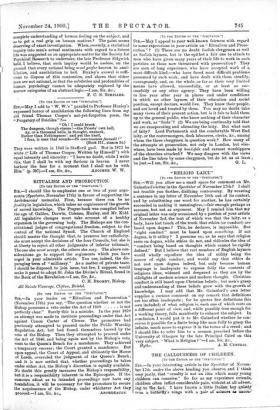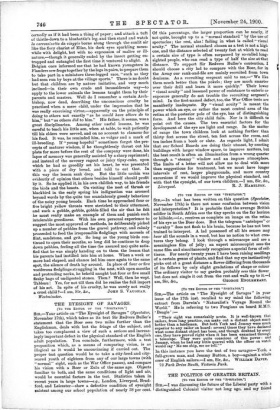THE CALLOUSNESS OF CHILDREN.
[To THE EDITOR OP THE 'SPECTATOR.'] SIR,—In your interesting article in the Spectator of Novem- ber 17th under the above heading you observe, and I think very justly, that "cruelty is not an idea which many young children can conceive." So far as my experience extends, children often inflict considerable pain, withont.at aladvert. ;Act; I have .1picnkn. a-little Italian.-boi.ipiiitlf trim a biittekiy's wings with a pair of Seisioii as snaoli'
cernedly as if it had been a thing of paper ; and attach a tuft of thistle-down to a bluebottle's leg, and then stand and watch /a carrozzinetta da viaggio borne along through the sunlit air like the fiery chariot of Elias, his dark eyes sparkling mean- while with delight, but with no expression of malice or ill- nature,—though it generally ended by the insect getting en- trapped and entangled the first time it ventured to alight. A Belgian once informed me that he had known youngsters in Flanders sew frogs together by the legs in pairs, to prepare them to take part in a miniature three-legged race, "such as they • had seen run by boys at the village sports." There is no doubt but that children are by nature imitative, and very much inclined—in their own crude and inconsiderate way—to apply to the lower animals the lessons taught them by their parents and masters. Well do I remember a certain Arch- bishop, now dead, describing the unconscious cruelty he practised when a mere child, under the impression that he was really exercising virtue,—apparently on the principle of doing to others not exactly "as he would have others do to him," but "as others did to him." His father, it seems, was a great disciplinarian. Among other useful lessons, he was careful to teach his little son, when at table, to wait patiently till his elders were served, and on no account to clamour for his food. It was, he reminded him, so vulgar and a mark of ill-breeding. If "young hopeful" sometimes forgot the pre- cepts of maturer wisdom, if he thoughtlessly thrust out his plate for more before the rest of the company were done, his lapse of memory was generally assisted by a sharp reprimand; and instead of the savoury ragout or juicy tipsy-cake, upon which he had so greedily set his heart, he was presented with a piece of dry bread, and told to eat that. In this way the lesson sank deep. But the little urchin was evidently of opinion that others besides himself should profit By it. So he applied it, in his own childish way, to his friends the birds and the beasts. On visiting the nest of thrush or blackbird in the early spring his indignation was aroused beyond words by the quite too scandalously greedy behaviour of the noisy young broods. Each time he approached four or five bright yellow throats were stretched to their uttermost, and such a gobble, gobble, gobble filled the air that he felt he must really make an example of them and punish such intolerable greediness. With his own personal experience to suggest the most approved of methods, he deliberately picked up a number of pebbles from the gravel pathway, and calmly proceeded to feed the irrepressible fledglings with morsels of flint, sandstone, and grit. So long as the young birds con- tinued to open their mouths, so long did he continue to drop down pebbles, feeling all the time (he assured me) quite satis- fied that he was simply handing on to them the lesson that his parents had instilled into him at home. When a week or more had elapsed, and chance led him once again to the same spot, the silence of death lay around. In place of four or five vociferous fledglings struggling in the nest, with open mouths and protruding necks, he beheld naught but four or five small fleshy bags of undigested stones. Then ? Well, then he wept. Tableau! Yes, for not till then did he realise the full import of his act. In spite of his cruelty, he was surely not really
a cruel child ?—I am, Sir, &c., JOHN S. VAUGHAN. Westminster.











































 Previous page
Previous page